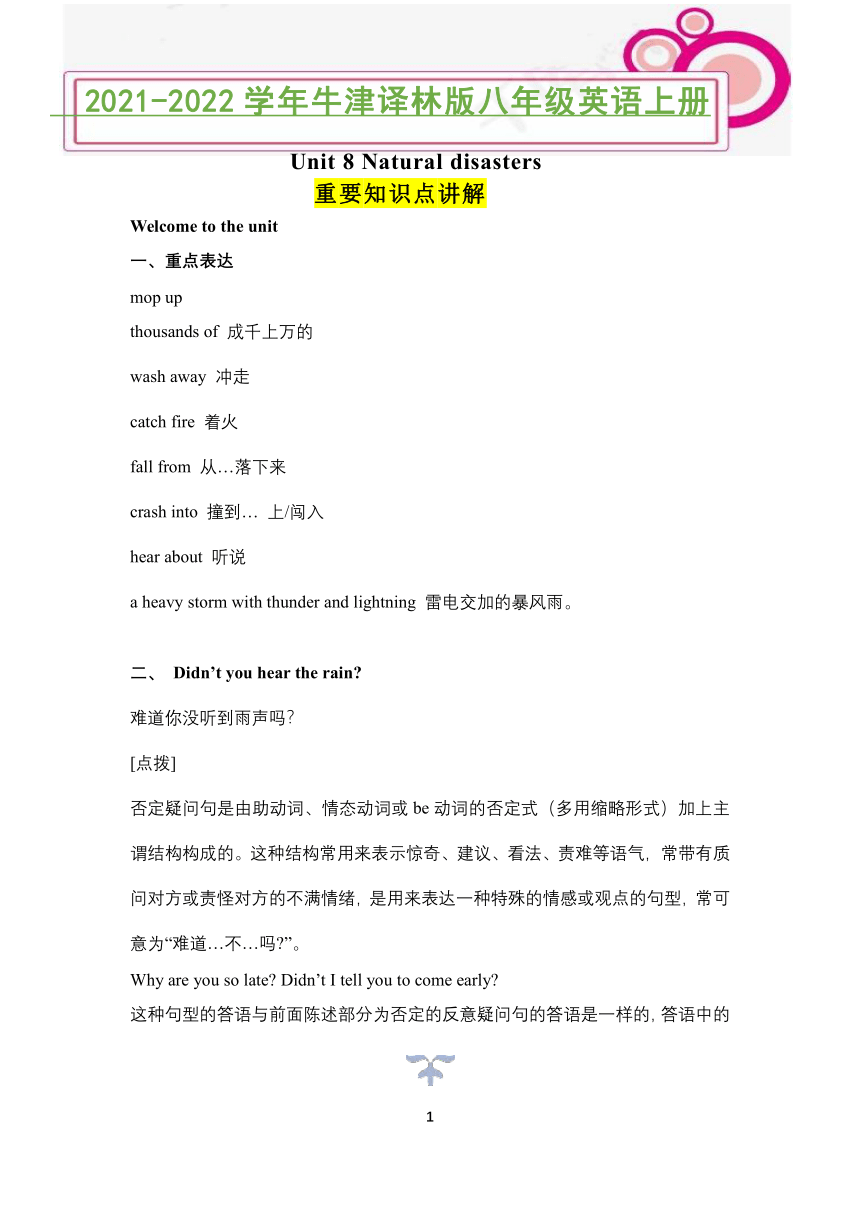
Unit 8 Natural disasters 重要知识点讲解 Welcome to the unit 一、重点表达 mop up thousands of 成千上万的 wash away 冲走 catch fire 着火 fall from 从…落下来 crash into 撞到… 上/闯入 hear about 听说 a heavy storm with thunder and lightning 雷电交加的暴风雨。 二、 Didn’t you hear the rain? 难道你没听到雨声吗? [点拨] 否定疑问句是由助动词、情态动词或be动词的否定式(多用缩略形式)加上主谓结构构成的。这种结构常用来表示惊奇、建议、看法、责难等语气,常带有质问对方或责怪对方的不满情绪,是用来表达一种特殊的情感或观点的句型,常可意为“难道…不…吗?”。 Why are you so late? Didn’t I tell you to come early? 这种句型的答语与前面陈述部分为否定的反意疑问句的答语是一样的,答语中的No译作“是”,Yes译作“不”。答语中该用Yes还是No, 应根据答语的内容是肯定还是否定而定。 三、Who will mop up the water if I go home without you? 如果我不带你回家,谁来把水拖干净? [点拨] 1.mop up是动词+副词构成的短语动词,mop的现在分词和过去式都要双写末尾的福音字母p,即:mopping, mopped。 She’s mopping the floor. 2.mop up后接名词时,该词可以放在动词和副词之间,也可以放在副词的后面,若宾语是代词it或them时,则只能置于中间。如:mop up the water=mop the water up mop down 用拖把拖干净 mop…from…从…擦去 mop…with… 用…擦… Reading 一、重点表达 at first 一开始 a slight shake 轻微的晃动 a loud noise like thunder 如雷鸣般的响声 in fear 害怕地 run out of 从……跑出来 in all directions 四面八方 not at all 一点也不 go through 穿过,经过 calm down 平静下来 shout for help 大声求助 move away 移开 fall to the ground 摔到地上 give a loud high cry 大声哭喊 二、in all directions? [点拨] “四面八方”,相当于in every direction Butterflies flew away in all directions/in every direction.蝴蝶朝着四面八方飞去。 in the same/opposite direction 朝相同/相反的方向 in different directions 朝不同的方向 in the direction of… 朝…方向,向着… 三、A moment of fear went through my mind, but I told myself to calm down since I was still alive. 我脑中有过一瞬间的害怕,但是我告诉自己既然活下来了就一定要冷静。 [点拨] alive用作形容词时,意为“活着的”,常在系动词之后作表语,不可在名词前作定语。? We were happy that the little girl was still alive. living用作形容词时,意为“活的,有生命的”,既可在系动词之后作表语,又可在名词前作定语。 There are no living things on the moon. 四、People screamed in fear. 人们尖叫着跑开。 [点拨] in fear ?害怕地,恐惧地 They got lost in the forest. They had to try different ways in fear. 相似的结构还有: in trouble 有麻烦的 ?in need 需要帮助的 in danger 处于危险之中 in hunger 饥饿的 五、“I’m trapped,” I said to myself. “我被困住了”我告诉自己。 [点拨] be trapped ? 被困住,受困? He was trapped on that island for a long time.?他曾被困在那个岛上很长时间。 Someone was trapped in the lift the other day.?那天有人被困在电梯里。? Grammar 一、过去进行时 1.定义:过去进行时表示在过去某一时刻或某段时间内进行或发生的动作。 2.结构: 肯定形式:was/were+Ving 否定形式:was/were not+Ving 一般疑问句形式:Was/Were…Ving?? 3.常与表示过去的时间状语(last night, at that time, the whole morning, all day yesterday, f ... ...
~~ 您好,已阅读到文档的结尾了 ~~